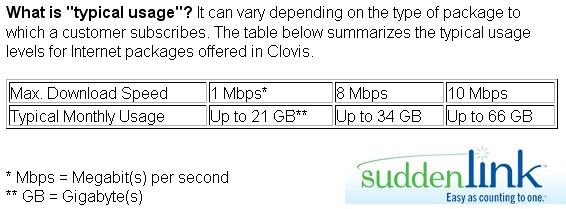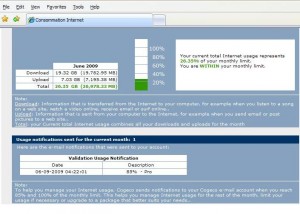Suddenlink Usage FAQ:
On June 1, 2009, we notified residential Internet customers in our Clovis, New Mexico cable system of a new online tool to help them monitor their Internet usage each month and determine if they are in the typical usage range.
If they are well above the typical range, it could mean several things. For instance: a virus or “spyware” application might have infected a customer’s computer and started generating high levels of Internet traffic, or someone else might be using a customer’s Internet connection without his or her knowledge. To help guard against those issues, we are offering customers a list of steps they can consider, to help make sure their computers and Internet accounts are protected and secure.
We introduced this Internet usage summary tool in Clovis, to evaluate its usefulness, after which we will consider expanding it to all of Suddenlink’s residential Internet customers.
Longtime Stop the Cap! readers will recognize this trick only too well. When a small cable operator spends its time, talent, and resources on “measuring tools” to help customers “determine if they are in the typical usage range,” it’s only a matter of time before that ‘experiment’ will turn into typical Internet Overcharging activity — usage caps, consumption-based pricing, overlimit fees and penalties, or service termination for those outside of that “typical usage range.”
Suddenlink, one of the nation’s smaller multiple cable system owners serving 1.3 million customers in mostly rural areas, is among the worst-rated providers in the country, based on actual customer reviews. Its journey towards Internet Overcharging schemes will do its ratings no favor when customers find out.
Suddenlink’s approach is less brazen than earlier Internet Overcharging attempts consumers have fought back. The company attempts to leverage the usual talking points about Internet activity into a justification for measurement tools, and cleverly tries to suggest the impetus for doing so is to protect customers who might have been hacked or have family members engaged in online activities unknown to others in the home. But the road that measurement tools provided by a cable company pave today lead to limits and higher pricing tomorrow.
Suddenlink’s contribution to the “education campaign” consumers are being subjected to before the pickpocketing begins does bring some useful information to the table, however. This small, mostly rural provider, turns in stunning statistics about average customer consumption:
Those numbers represent one of three things:
- Suddenlink is the first provider in a long list of providers producing honest statistics about broadband usage, not the low-ball estimates others have provided to make consumers feel guilty for exceeding them;
- Suddenlink’s statistics are wrong;
- People in Clovis download A LOT.
Just about every other major provider, and many small ones, have spent the past year telling the media and the public “the average user” consumes far less than what Suddenlink reports for Clovis, New Mexico:
- Frontier Communications: “Today, the average residential customer on Frontier’s network uses 1.5 gigabytes of bandwidth each month.” — Ann Burr 10/10/2008
- Time Warner Cable: “Our usage data show that about 30% of our customers use less than 1 GB per month.” — Landel Hobbs, COO 4/9/2009
- Time Warner Cable Austin: ‘Users download between 5-6GB per month on average.’ — Scott Young, senior director of digital systems 10/2008
- Comcast: “The average customer uses two to three gigabytes a month.” Jennifer Khoury, Comcast spokeswoman 10/29/2008
- Sunflower Broadband: “Our average users, about 77%, use 6 gigabytes or less of bandwidth per month. Our high-end subscribers, about 2%, use 50 gigs or more.” Sunflower Broadband Website 7/23/2009
- Bell (Canada): “Usage has increased… to more than 10GB (per average user) in 2008.” Bell Internet Usage Tutorial 7/23/2009
For the benefit of Suddenlink subscribers joining Stop the Cap! for the first time, here’s a road map for where things have traditionally gone among every other Internet provider that has introduced “measurement tools” for “your benefit” that were not beaten back by angry subscribers:


 Subscribe
Subscribe


